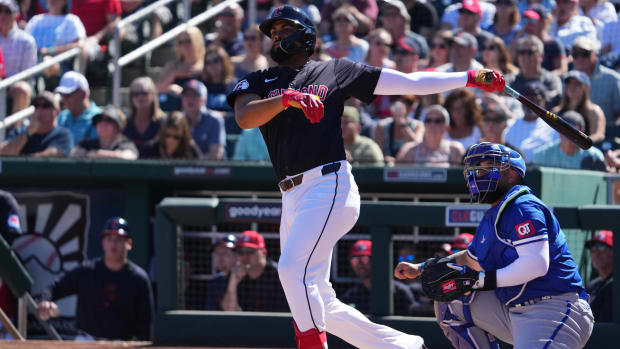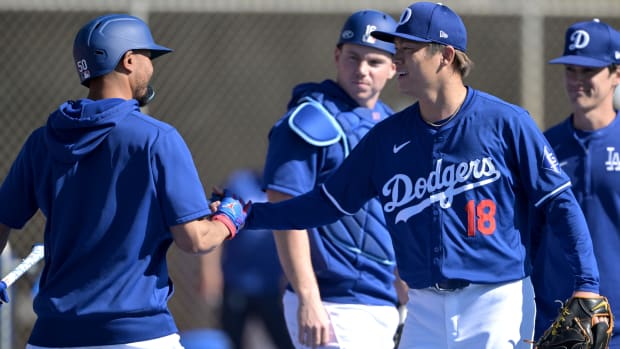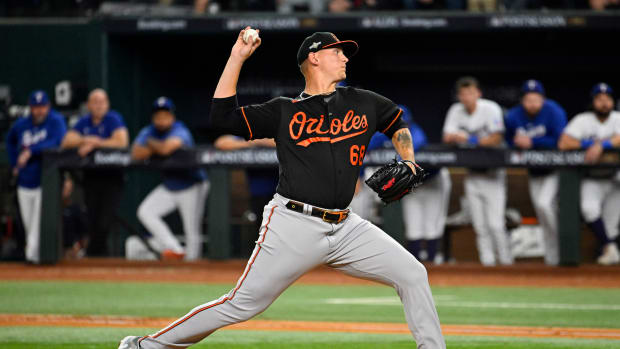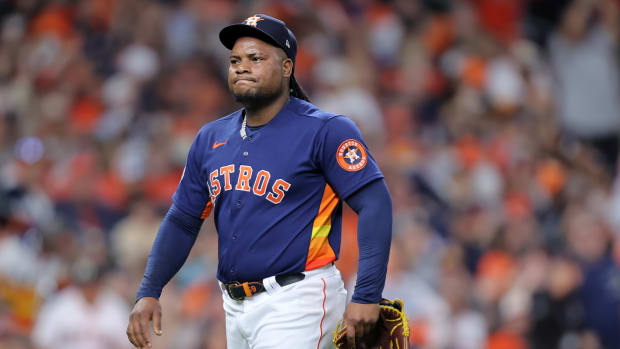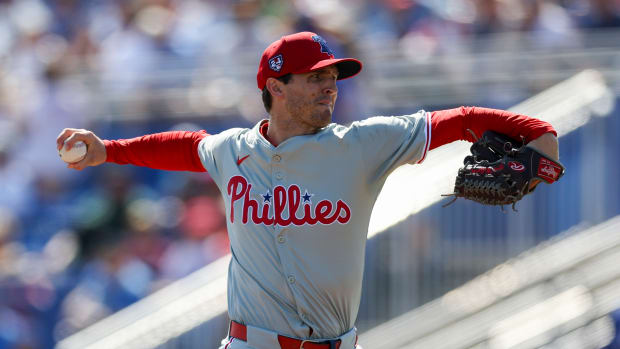Do Yankees have legal right to deny A-Rod bonus money for 660th homer?
Last Friday night against the Red Sox, Yankees designated hitter Alex Rodriguez blasted his 660th career home run, tying Willie Mays for fourth on the all-time list. If the 39-year-old Rodriguez can prolong his career for another few seasons, he could tie or eclipse Babe Ruth's mark of 714 home runs, leaving him behind only Hank Aaron (755) and Barry Bonds (762) in MLB history.
These milestones are not merely important for the history books, however. They also carry significant financial and legal repercussions for Rodriguez. When Rodriguez signed his 10-year, $275 million contract with the Yankees in 2007, there was a separate marketing agreement made concerning the home run records of Mays, Ruth, Aaron and Bonds. While the deal is not public, the team is reportedly obligated to pay Rodriguez $6 million for reaching each milestone if the Yankees also determine the milestone is “commercially marketable” to the team.
A-Rod, Astros, Trout and mighty 'pens among early trends to watch
That last part is at the crux of a developing fight between the Yankees and Rodriguez. On Saturday, Yankees general manager Brian Cashman told reporters that the team would not pay the slugger his $6 million bonus for tying Mays, saying that, "We have the right but not the obligation to do something, and that's it ... We're going to follow the contract as we follow all contracts, so there is no dispute, from our perspective." It's consistent with the Yankees' stance on the matter going back to the offseason, when the New York Daily News reported that the team was "preparing for a battle" over payment of Rodriguez's milestone bonuses. Rodriguez will likely challenge that, with the New York Post reporting that "every indication is that he will challenge the Yankees' interpretation of the side deal."
Is Rodriguez legally entitled to that bonus, or do Yankees contractually have the right to deny him the money?
Original rationale for the home run milestones
Before getting into the issue, it's worth noting how the bonuses came to be. The Yankees initially agreed to a marketing contract with Rodriguez for at least four reasons. First, it made it more likely that Rodriguez would sign his extension, with the milestones acting as part of the compensation contemplated in his $275 million contract. Second, the team could use the deal as additional incentive for Rodriguez to perform at a high level, as long-term contracts in baseball are almost entirely guaranteed. Third, the team and Rodriguez were barred by league rules from negotiating a bonus for "batting skill," but a marketing bonus was permissible. Fourth, the Yankees recognized their own opportunity for moneymaking through promotions, ticket sales and media if Rodriguez reached those milestones.
Why the fall of A-Rod matters in this contract dispute
Due to injuries and declining performance, Rodriguez’s home run totals dropped from 35 in 2008 to 18 in '12. Despite that, Rodriguez was still on pace to make history as the '13 season began: The 36-year-old slugger had hit 647 home runs by that point, and if he averaged 20 home runs over the next six seasons, he would become the all-time home run leader. Topping 762 home runs was unlikely, but Rodriguez's chase of Aaron, Ruth and Mays would have still generated massive fan and media interest.
Alex Rodriguez hits 660th home run, reaches milestone worth celebrating
But 2013 proved to be a disaster for Rodriguez. In August, then-commissioner Bud Selig suspended Rodriguez for 211 games, the longest non-lifetime ban ever imposed in baseball, as punishment for Rodriguez violating both the Joint Drug Prevention and Treatment Program and the Collective Bargaining Agreement through his use of human growth hormone and testosterone and his attempt to cover up his violations by obstructing the league's investigators. As was his legal right, Rodriguez filed a grievance and played out the remainder of the season. In January 2014, an arbitrator upheld Rodriguez’s suspension but reduced it to 162 games. He missed the entire '14 season as a result, and the Yankees were relieved of paying him $25 million for that season.
If the Yankees refuse to pay, the case could be headed for arbitration
Despite being denied his bonus, Rodriguez—whose net worth is thought to exceed $300 million—appears unconcerned. He has carefully declined to criticize the Yankees, instead stressing that his focus is on baseball and not on contract issues. As he put it to reporters on Sunday, "I haven't given [the bonus] much thought."
Even if Rodriguez avoids public critique of the Yankees, he may still pursue a legal challenge over the team’s refusal to pay. Rodriguez’s agents, who would receive a commission on the $6 million bonus, have an incentive to encourage him to pursue the money. The Major League Baseball Players Association likely has a similar viewpoint, since it does want the creation of a precedent whereby a team can refuse to pay a contractual obligation. The most likely scenario for a legal challenge would be Rodriguez, through the MLBPA, filing a grievance; he reportedly has 30 days from the date New York formally declines to pay him to file one. This would set in motion a review by an arbitrator of whether or not the Yankees are obligated to pay Rodriguez.
A-Rod's actions going forward will dictate meaning of 660th home run
Without seeing the actual marketing contract, it is difficult to assess with certainty whether the Yankees are obligated to pay Rodriguez. One leaked passage indicates the Yankees have substantial control over whether to pay the bonus: “It's the sole discretion of the New York Yankees to determine whether each of these milestones is commercially marketable as the home-run chase.” In other words, the team has the right to assess whether Rodriguez reaching 660 home runs was “commercially marketable” as a qualifying condition to paying him.
The use of the phrase “commercially marketable” is crucial. Unless this phrase is defined in the marketing contract, a legal debate could ensue as to how the phrase should be defined. While the Yankees have “sole discretion” to determine if the milestone was “commercially marketable,” the team does not appear to have the same unilateral authority to determine the relevant definition of “commercially marketable.”
Legal analysis of “commercially marketable”
The phrase “commercially marketable” has been the source of numerous cases over the years. In 1958, a federal district court in Ohio studying the sale of mineral products defined “commercially marketable” as referring to “economically feasible” and demonstrating “the prospect of substantial sales with the possibility of a profit.” In 1967, the U.S. Court of Appeals for the Fifth Circuit interpreted “commercially marketable” in the context of manufacturing as meaning “ready for industrial use or consumption.” These depictions suggest that significant sales are a key component of commercial marketability, although profit is not required. Applying these interpretations to Rodriguez’s situation, the question becomes whether Rodriguez’s home run chase has increased sales (whether it be tickets, merchandise, more television viewers or some other metric) for the Yankees. If the answer is yes, Rodriguez would seem to have a case that the requirement of commercial marketability has been met.
It is also worth highlighting how the phrase “commercially marketable” has been addressed in sports cases. In 1996, the U.S. Court of Appeals for the Tenth Circuit examined in Cardtoons v. MLBPA whether a trading card company could make parody cards of big league players without those players’ permission. In holding for the card company, the court stressed that commercial marketability for an athlete is a necessary byproduct of his performance:
Most sports and entertainment celebrities with commercially valuable identities engage in activities that themselves generate a significant amount of income; the commercial value of their identities is merely a by-product of their performance values. Although no one pays to watch Cormac McCarthy write a novel, many people pay a lot of money to watch Demi Moore “act” and Michael Jordan play basketball.
Taking this idea to Rodriguez, his home run chase seems distinguishable from the controversies that have tarnished his career. This only seems true, however, if fans are interested in watching Rodriguez chase home run records in spite of those controversies.
Core legal arguments for Rodriguez and Yankees in regards to “commercially marketable”
From Rodriguez’s perspective, his chase of 660 home runs has clearly been commercially marketable. It has attracted considerable interest from fans and media; newspapers, magazines and websites have discussed it; and it has been profiled on national TV. There is thus a plausible argument that Rodriguez has generated ticket sales and television viewers—meaning dollars—for the Yankees. Along those lines, Rodriguez’s attorneys might be able to supply empirical evidence in the form of ticket sales or television ratings that supports the argument that the Yankees have profited by the home run chase. If so, Rodriguez would contend, reaching the home run milestone should be deemed “commercially marketable,” and the team should pay him his $6 million.
Power Rankings: Red-hot Astros rise, struggling White Sox plummet
The Yankees likely have a different perspective over what constitutes “commercially marketable.” The team, which has carefully avoided any promotion of Rodriguez’s home runs this season, appears to regard fan interest in the home run chase as indicative more of morbid curiosity than fan engagement. Rodriguez has become one of the most infamous athletes of this era, and many baseball fans associate his accomplishments as aided by cheating and not worthy of celebration. Consider that, in Sports Illustrated’s 2014 “The Most Disliked People in Sports” feature, Rodriguez was ranked second after former Los Angeles Clippers owner Donald Sterling and was regarded as more hated than NCAA president Mark Emmert, NFL commissioner Roger Goodell and boxer Floyd Mayweather Jr.
The Yankees have a sensible argument that Rodriguez’s home run accomplishments are difficult, if not impossible, to market. After all, if fans and media view Rodriguez as a villain, it would could be counterproductive for New York to promote his achievements as worthy of the team’s storied history. Legally, therefore, Rodriguez reaching 660 home runs would not constitute commercial marketability.
The Yankees need to be careful in assessing whether “commercially marketable” has been satisfied. The team has a good faith obligation in making this assessment, which means it can’t ignore data and other evidence that refutes its conclusion merely because it could lead to the team paying Rodriguez.
Legal relationship of the marketing contract to 10-year player contract
One potential complicating factor is that the marketing contract is a separate document from Rodriguez’s player contract with the Yankees and could be “incorporated by reference” into Rodriguez’s contract. This is a potentially crucial point. If the player's contract expresses that the marketing deal was reached as part of the original negotiations that led to the player contract, Rodriguez might have a better legal argument that the Yankees are wrongfully punishing him by declining to pay him the $6 million bonus.
How would that argument work? The Joint Drug Treatment and Prevention Program makes clear that punishment for PEDs is to be made by the Commissioner’s office, and not by teams:
7.M. Exclusive Discipline
All authority to discipline Players for violations of the Program shall repose with the Commissioner's Office. No Club may take any disciplinary or adverse action against a Player (including, but not limited to a fine, suspension, or any adverse action pursuant to a Uniform Player’s Contract) because of a Player’s violation of the Program. Nothing in this Section 7.M is intended to address whether: (i) a Club may take adverse action in response to a Player’s failure to render his services due to a disability resulting directly from a physical injury or mental condition arising from his violation of the Program; or (ii) a Club may withhold salary from a Player for any period he is unavailable because of legal proceedings or incarceration arising from his violation of the Program.
Rodriguez could say that the Yankees are essentially double-punishing him for his use of PEDs by denying him his milestone bonus.
The Yankees have several arguments. First, Rodriguez was suspended for violating both the Joint Drug Treatment and Prevention Program and the CBA. His attempts to cover up his involvement with the Biogenesis clinic, in the view of Baseball, constituted conduct detrimental to the best interests of the game. Rodriguez’s protection from double punishment found in the Joint Drug Treatment and Prevention Program does not extend to punishment under the CBA.
Second, the Yankees would insist that their refusal to pay him a milestone bonus has nothing to do with “punishment” or even his suspension. The Yankees would stress that the only calculation that matters is whether the home run chase is commercially marketable to the team. The Yankees appear convinced it is not.
Settlement possible
While the Yankees possess a reasonable legal argument that they do not need to pay Rodriguez, it may nonetheless prove unwise for the team to take this position. An in-season grievance might distract Rodriguez, who has a history for stirring the pot in media interviews. It could also create turmoil on the team: Even if Rodriguez's teammates don't like him personally, they might regard the team’s refusal to pay him as wrong and disloyal. Those players may then wonder whether the team will play hardball in paying them their bonuses.
The Yankees, it should be noted, are also worth somewhere in the neighborhood of $2.5 billion. Giving Rodriguez $6 million may not quite be a rounding error for the team’s accountants, but New York can clearly afford to pay him with ease. Letting that money possibly stand in the way of team harmony could be penny wise and pound foolish.
One possibility is for the Yankees and Rodriguez to reach a settlement whereby the team gives him less than $6 million and pledges to pay him should he reach the other milestones. Both sides could portray the settlement as a victory of sorts, and it would ensure the team—and Rodriguez—remain focused on winning.
Michael McCann is a Massachusetts attorney and the founding director of the Sports and Entertainment Law Institute at the University of New Hampshire School of Law. He is also the distinguished visiting Hall of Fame Professor of Law at Mississippi College School of Law.































